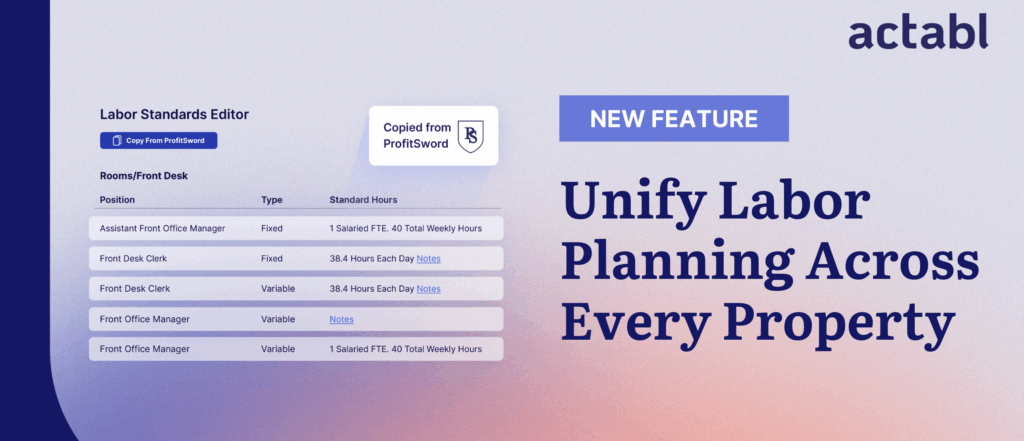
The GM Fixer’s Playbook: How to Lead with Flexibility, Culture, and Smarter Hotel Labor
Between economic pressures and staffing shortages, hotel labor management continues to challenge operators across the industry. But it’s not all bad news; these challenges are also opportunities to rethink how hotels support their teams, structure their schedules, and plan labor strategically.
To get expert insight, we sat down with a seasoned hospitality leader, Shanell Marinuzzi, affectionately known in the industry as “the GM fixer.” She’s turned around countless underperforming hotels through intentional culture-building, smart scheduling, and a relentless commitment to her team. In this interview, she shares how hotel leaders can better manage labor costs, retain staff, and take a more flexible, human approach to leadership.
The Biggest Hotel Labor Challenges Today
Given the current economic pressures and ongoing staffing shortages, what do you see as the most significant labor-related challenges facing hotel operators today, and how can they begin to address them proactively?
For me, it’s the shift in the labor pool. Before the pandemic, we had experienced people who understood the industry and passed that knowledge on to future leaders. But when COVID hit, many of those people were laid off or moved into other industries. That created a huge knowledge gap, and it changed the expectations of the people we’re hiring today.
Now, we’re onboarding people who haven’t worked in hotels before. They’re still learning terms like RevPAR and ADR. So we’re going back to the basics—teaching fundamentals while also trying to keep people engaged and wanting to stay in the industry.
And it’s not just knowledge—it’s wages and lifestyle. People left hospitality for roles that paid more and gave them better work-life balance. To bring them back, we need to rethink how we schedule. That means moving beyond traditional shifts like 7–3 or 3–11 and offering mid-shifts or cross-shifts that create more flexibility.
I also think a lot about generations. We’re in a unique moment—Boomers, Millennials, and Gen Z are all working in the same hotel, but they value totally different things. Boomers grind. Millennials want to make an impact. And Gen Z wants flexibility and balance because they’ve seen what burnout looks like. To keep everyone engaged, we have to create environments where all generations can thrive together, and that means offering flexibility, creating impact where associates can make a difference in their community and environment, supporting mental health, and teaching people along the way.
How to Control Labor Costs Without Compromising Service
In your experience managing hotel labor, what strategies have proven most effective for controlling labor costs without compromising guest satisfaction or service quality?
First and foremost, open communication. If people don’t know what’s happening, they’ll assume the worst—“Are we cutting jobs? Are we in trouble?” So I always started with transparency.
I also ran lean on purpose. I didn’t overstaff, but I also didn’t sacrifice service. I leaned heavily on cross-training, but only for team members who wanted it. If someone at the front desk wanted more hours, I’d ask if they’d be open to helping with breakfast or assisting housekeeping on weekends. I never forced it. That way, it felt like a choice, not a burden.
I always focused on their “why.” If someone needed more hours to support their family, I worked with them to get those hours without pushing full-time team members into overtime. This created balance and empowered people who really wanted to learn.
And I always say, "You can’t be a strong hotel leader if you don’t understand every department." I never asked anyone to do something I hadn’t done myself. I got my hands wet, I stripped beds, and I served breakfast. That earned trust.
Hospitality is a team sport. The more people understand different roles, the stronger your team becomes.
Why Labor Tech is Worth the Investment
What advice would you give hotel leaders who are hesitant to invest in labor management technology?
I used to be that person. I thought my Excel schedule was unbeatable. I literally tried to “break” Hotel Effectiveness just to prove I didn’t need it. I failed miserably.
When I finally embraced it, I reduced overtime by 50%. My spreadsheet worked for years, but tech gave me insight I didn’t know I was missing, especially during peak seasons. When everyone’s running around, you miss the little things—like two hours of overtime here or there. But those little hours add up fast.
I always say: you remain stagnant if you don’t grow. Tech doesn’t replace your instincts—it enhances them. And with where AI is going, you’ll be forced to adopt tech sooner or later. Why not get ahead of it now?
I wish I’d done a case study on myself—before and after using Hotel Effectiveness—because the ROI was real. I could have made even more money for my owners had I adopted it earlier in my career.
Culture Over Compensation: How to Retain Staff in Tough Environments
What approaches have you found most successful in engaging and retaining staff, particularly in high turnover environments where wage increases may not be feasible?
Every time I was brought into a property, it was because things were broken: turnover, low GSS scores, poor team morale. The first thing I did was meet the team and start listening. The first 30 days, I did not change anything, I learned from the team, listened to their challenges, and started asking what was working and what was not with them. I’ve always had an open-door policy. If my door’s open, come in. I will stop what I’m doing—because people come first.
I reminded them that guests pay our paychecks. To take care of guests, we have to take care of each other. So, I’d check in with the team constantly and make sure they felt valued, whether they were in laundry, engineering, the front desk, or leadership. People forget their impact when things get chaotic, so I made it a priority to remind them.
At every property, we created a mission statement together. Every person contributed a word or value, and we used that to guide our huddles. We tied the mission to their personal “why.” And we talked about it every day.
And I always jumped in—I didn’t lead from a distance. I led from the laundry room, from the housekeeping floor, from breakfast service. I wanted them to see that we’re in this together.
That culture made the difference. In Salt Lake, I had a housekeeping team stay with me for 6+ years. People always asked how. It wasn’t about the dollars. It was about creating a culture of empowerment, trust, and love. When people feel seen and supported, they work hard for you every day.
What to Do When Metrics Slip
When labor metrics start to slip or staffing issues impact performance, what immediate steps should hotel leaders take to regain control and realign with operational goals?
Go back to your people. Understand their “why” and help them connect it to the hotel's success. Even if someone’s just working to pay bills—that’s valid. And if someone wants to grow into leadership, give them mentorship. Let them explore departments, shadow leaders, and see what they like.
Some roles might be a “nope” for them, but others might unlock something. I loved helping people discover that.
I’m also a big believer in competitions, acknowledgement for doing good, and small wins. Every leader who worked with me also carried Thank-You Cards with them. I challenged them every week to find something that someone on their team did right and tell them thank you on a personal note card. These were very inexpensive cards that made a huge impact on our team. Every leader had them and had to use all 20 cards I provided by the end of each quarter.
At one property, we had four hotels in a resort area. I’d run little contests—who had the best GSS score this week? I’d show up with a candy bar. I also used 4imprint and Positive Promotions to get free swag to give out. You don’t need a huge budget to show appreciation.
And finally, know your numbers. I tell people all the time—if you don’t know your numbers, someone else will. And it’s probably going to be your owner.
I always knew our ADR, occupancy, and RevPAR. We had departmental goals posted in the back of house—engineering PMs, MPR for housekeeping, GSS or loyalty enrollments for the front desk. We talked about them every week. If it’s not written down, it’s not a goal—it’s a dream.
Transform Labor Challenges Into Opportunities
Whether it’s reshaping schedules, improving culture, or investing in better tools, there’s no one-size-fits-all solution to hotel labor. But as Shanell reminds us, leadership rooted in empathy, empowerment, and accountability can make all the difference.
Want to speak to one of our experts, like Shanell? Secure your strategy session and let’s discuss how we can help you optimize costs, retain talent, and build a better hospitality workforce.





